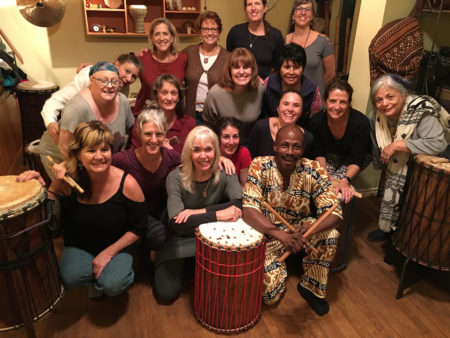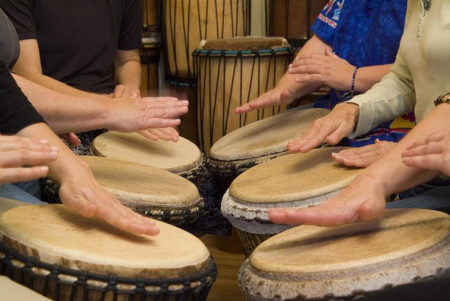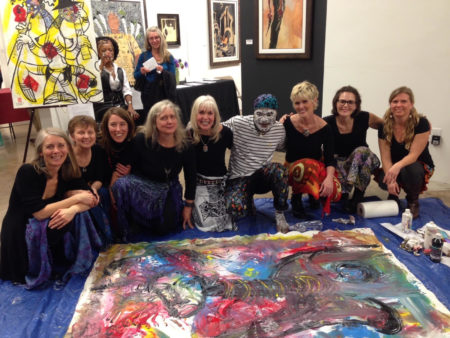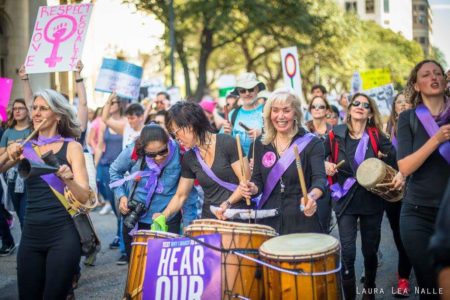Longtime hand-drumming teacher and Austinite Sherry Gingras uses drumming to empower women.
By Mauri Elbel, Photos courtesy of Sherry Gingras and Laura Lee Nalle
 It’s a stormy Tuesday evening and the walls and floors of Life in the City church are vibrating with the resounding rhythms created by the 30 female drummers who make up the Drumsistas. Inside the South Austin space the group rents for practices, rich, layered rhythms rise up from djembes and djundun bass drums to create the powerful African music that spills out into the surrounding streets.
It’s a stormy Tuesday evening and the walls and floors of Life in the City church are vibrating with the resounding rhythms created by the 30 female drummers who make up the Drumsistas. Inside the South Austin space the group rents for practices, rich, layered rhythms rise up from djembes and djundun bass drums to create the powerful African music that spills out into the surrounding streets.
Sherry Gingras, a native Austinite and longtime hand-drumming teacher, leads the Drumsistas as they rehearse for their upcoming benefit concert. For more than a decade, the all-women drum ensemble, comprised of students of all ages and backgrounds, hosts an annual benefit concert to support a cause that aligns with their vision for a better, safer and more sustainable world. This year, the Drumsistas’ concert will take place on June 2 at 7:30 p.m. at the Unity Church of the Hills with proceeds benefitting Posada Esperanza, a transitional-housing program providing shelter and assistance for immigrant mothers and their children escaping domestic and cultural violence.
“Music is our universal language,” Gingras says as she walks around Drumz, her sun-splashed shop and studio where she teaches drumming classes and sells authentic percussion instruments. “Drumming has been used to…heal and empower and build community throughout history and today.”
Inside the percussion paradise known as Drumz, drumming is the primary tool used to empower, create a sense of connection and help people discover deeper ties to both nature and themselves. In addition to teaching and directing the Drumsistas, Gingras also heads up local all-women drum-song performance ensemble The Djembabes, leads monthly drum circles and teaches an array of percussion and drumming classes at Drumz.
 But for the third-generation Austinite, mother of six and grandmother of five, drumming was an unexpected career path. Gingras majored in psychology at the University of Texas and worked in the fashion industry for years before ever pounding a drum.
But for the third-generation Austinite, mother of six and grandmother of five, drumming was an unexpected career path. Gingras majored in psychology at the University of Texas and worked in the fashion industry for years before ever pounding a drum.
“I loved working in the fashion industry because it was mostly women and it was fun and creative, and I did my best to create clothing of suedes and soft leathers that would make any woman feel beautiful,” she says. “But I was really struck with their reactions when they tried on clothes; they would start tearing themselves down and it was very disheartening to see women doing that to themselves. I rarely ever saw someone look in the mirror and compliment themselves.”
One day when Gingras and her husband, who both play string instruments, stumbled upon West African djembes at Strait Music Company, they were immediately drawn to them.
“It was the first time I had even seen them,” Gingras recalls. “We just started tapping around. I decided to get one for my husband, and I secretly put it on hold. I was going to pick it up on Saturday, but he went on Friday to get it for me.”
Gingras had already begun teaching Nia, a dance form that focuses on empowering women to honor themselves, and drumming opened that door even further.
 “It’s exhilarating, joyful and empowering,” Gingras says of drumming. “It is like having a voice, a very loud voice.”
“It’s exhilarating, joyful and empowering,” Gingras says of drumming. “It is like having a voice, a very loud voice.”
Gingras immediately recognized the way drumming is intrinsically tied into the social fabric of the community. As a teacher of the expressive art form, it’s part of her mission to dispel people’s illusion that they aren’t musical or they have no innate talent for music.
“Drumming ties everyone into nature. It gives them a deeper sense of themselves and their relationships, and it helps people find their common ground,” she says. “Once you find your connection to rhythm––and drumming is one way––you realize the connection to your own heart and the rhythms that connect us with one another. It is a way to feel a deeper sense of community and to build community.”
Just as music can be a barometer of how healthy a community is throughout various cultures, Gingras says she has noticed her students transform in noticeable ways through drumming. With the Drumsistas, whose members range from their 20s to mid-70s, she’s noticed women develop more self-confidence, more openness and greater willingness to share who they truly are. In the group, there is no judgment or competition. Rather, it’s a supportive community.
Lois Lemacks, who began taking lessons from Gingras nine years ago and is entering her eighth year with the Drumsistas, has found connection, support and healing through drumming.
“I feel like it has added sisterhood, a sense of connectedness and a real place and purpose in my life,” says Lemacks, a cancer survivor who went through surgery and chemotherapy last year. “I was really worried I wouldn’t have the energy to play, but coming back has been the best thing. This heals our souls and our bodies.”
 She says Gingras helps to create the positive environment in which all those things are possible.
She says Gingras helps to create the positive environment in which all those things are possible.
“That woman can teach a wall to drum,” Lemacks says. “Without Sherry, that sisterhood would not be there. There is no competition here. It is all love and support. No one I’ve ever met could lead a group like she does. She leads through example and inspiration.”
In today’s divisive times, Gingras says we have to realize we are all in this together, and drumming can be a powerful tool to unite a community, move dreams into action, keep hope active and open the door to feeling stronger.
“It is about people supporting each other, being happy when they see someone else succeed,” Gingras says. “It is very important for women in this point in time to connect in that. It’s a simple philosophy. It’s about recognizing each and every one of us has a special reason for being here and about sharing our gifts and passions. It is in everyone’s best interest to support everyone else. It’s not about competing, but knowing everyone here has an important role to play.”
Learn more at drumzaustin.com.

